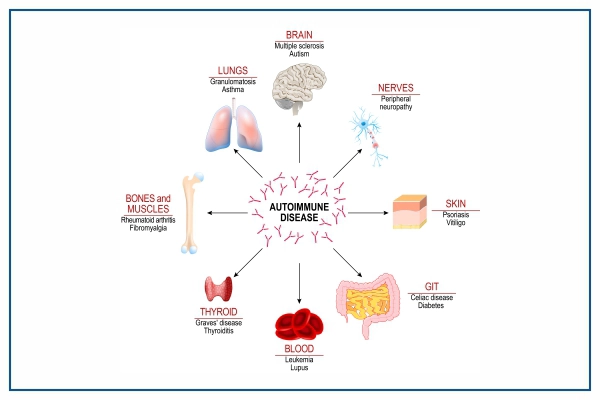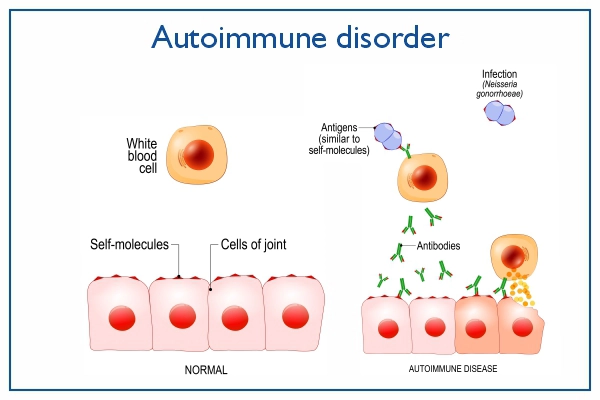What is Autoimmune Disease?
- The immune system is made up of specialized cells and chemicals that combat bacteria and viruses responsible for causing infections.
- When the immune system mistakenly attacks the body's tissues, autoimmune diseases develop.
- Autoimmune diseases are categorized into organ-specific and non-organ-specific types.
- Organ-specific diseases target one organ, while non-organ-specific disorders affect multiple organs or body systems.
- There are approximately 80 different autoimmune disorders, ranging from mild to severe based on the organ affected and the extent of the damage.
- Women are more susceptible to autoimmune diseases than men, especially during reproductive age, possibly due to sex hormones playing a role.
While the symptoms of autoimmune illnesses can be managed, there is typically no cure available.
Secure your health with a second opinion. Make informed decisions and book your appointment today!
Get A Second Opinion
Types of Autoimmune Disease :
Autoimmune disorders can affect almost any organ or system in the body. There are about 80 different types of autoimmune disorders. Some of the autoimmune disorders are
What are the Symptoms of Autoimmune Diseases?
The symptoms of autoimmune disease include:
Find Our Specialists
When to see a doctor?
See a doctor if you have symptoms of an autoimmune disease. You might need to visit a specialist, depending on your disease type.
- Rheumatologists for rheumatoid arthritis and other autoimmune disorders such as Sjögren's syndrome and SLE.
- Gastroenterologists for GI disorders such as Celiac disease and Crohn's disease.
- Endocrinologists for conditions related to glands such as Graves' disease.
- Dermatologists for skin disorders such as psoriasis.
Experienced doctors at Medicover can help you get the right treatment and management for different autoimmune diseases and their symptoms.
What are the Causes of Autoimmune Disease?
Doctors are uncertain what causes the immune system to malfunction. However, some people are more likely than others to develop an autoimmune disease. Certain autoimmune disorders, such as multiple sclerosis and lupus, are inherited. Not every family member will have the same disease, but they will inherit a vulnerability to an autoimmune disorder. Because the prevalence of autoimmune illnesses is increasing, scientists suspect that environmental factors such as infections and exposure to chemicals or solvents may be responsible.
What are the Autoimmune Disease Risk factors?
Autoimmune disorders can affect anyone, but specific conditions induce the risk. The risk factors for the various types of autoimmune disorders vary. However, some common factors include
- Genetics: Certain autoimmune diseases run in families. A person may be born with genes predisposing them to a condition, but they may not acquire it until they are exposed to a combination of triggers.
- Environmental Factors: Environmental factors, such as sunlight, certain chemicals, and viral or bacterial infections, can all impact the formation of autoimmune diseases
- Gender: Due to hormonal factors, women are more likely to develop more autoimmune disorders than men, except for Ankylosis Spondylitis which is more common in men than women.
- Hormones: Autoimmune illnesses are more common throughout the reproductive years. Some diseases tend to be influenced by major hormonal changes such as pregnancy, delivery, and menopause, for better or worse.
- Infection: Some disorders seem to be triggered or worsened by certain infections.
What are the Autoimmune Disease Complications?
Autoimmune disease complications can be serious or even fatal. The severity of complications is usually based on the type of autoimmune disease and the individual patient. Autoimmune disease complications can include:
- Blindness
- Bleeding and blood clots
- Joint and bone damage
- Cancer
- Other autoimmune disorders might develop.
- Infections that occur frequently, such as pneumonia and bronchitis
- Cardiovascular disease and blood vessel damage
- Neuropathy, paralysis, seizures, and stroke are all examples of nervous system problems.
- Adhesions
- Organ damage and failures, such as liver and kidney failure
- Pancreatitis
- Complications during pregnancy
How to get an Autoimmune Disease Diagnosed?
Most autoimmune disorders cannot be diagnosed with a single test and a high degree of suspicion is needed to correlate the symptoms. To diagnose patients, the doctor will use a combination of tests, a review of the symptoms, and a physical examination, especially if multiple organs or systems are affected. Methods of diagnosis may vary depending on the disease. They commonly include
- Physical examination
- Medical history
- Blood tests, including those to detect autoantibodies
- Biopsy
- X-rays
- ANA Blot
Autoimmune Disease Treatment:
Treatments can’t cure autoimmune diseases, but they can control the overactive immune response and bring down inflammation or at least reduce pain and inflammation. Drugs used to treat these conditions include:
- Anti-inflammatory drugs to reduce inflammation and pain
- Corticosteroids to reduce inflammation. They are sometimes used to treat an acute flare of symptoms
- Pain-killing medications such as paracetamol and codeine
- Immunosuppressant drugs to inhibit the activity of the immune system
- Physical therapy to encourage mobility
- Treatment for the deficiency, for example, insulin injections in the case of diabetes
- Surgery to treat bowel blockage in the case of Crohn's disease
Do’s and Don’ts
Psoriasis, multiple sclerosis, disease, rheumatoid arthritis and inflammatory bowel Hashimoto's hypothyroidism appear to be unrelated at first glance. As they have different impacts on different parts of the body. However, they have one thing in common, they are all autoimmune disorders. The food you consume, the lifestyle you lead, and the way you respond and manage a condition have a significant impact on your overall health. If you have an autoimmune condition, following these dos and don'ts will help you manage it.
Autoimmune Disease Care at Medicover
At Medicover Hospitals, we have the most trusted group of doctors and healthcare professionals who are skilled at providing the best medical treatment to patients while showing compassion and care. To conduct the necessary investigations for diagnosing Autoimmune Disease, our diagnostic department is equipped with state-of-the-art technology and equipment. Our excellent team of specialists comprising Rheumatologists, gastroenterologists, dermatologists and other specialists uses a systematic and multi-disciplinary approach to identify and treat the condition. They provide treatments for this condition with great precision offering desirable results.
Ready to take control of your health journey? Book your appointment now and start your path towards wellness today!
Book an Appointment
Frequently Asked Questions
Autoimmune diseases occur when the body's immune system mistakenly attacks its tissues, leading to inflammation and damage to various organs and systems.
Common symptoms include fatigue, joint pain, fever, rashes, and inflammation. However, symptoms can vary widely depending on the specific autoimmune condition.
Diagnosis typically involves a combination of medical history review, physical examination, blood tests to check for antibodies and inflammation markers, and sometimes imaging tests like X-rays or MRIs.
Treatment often involves medications to suppress the immune system's abnormal activity, alleviate symptoms, and reduce inflammation. Lifestyle changes such as stress management and a healthy diet may also be recommended.
Proper waste removal is crucial in managing autoimmune diseases as it helps reduce inflammation and prevent the accumulation of toxins that can exacerbate symptoms. Adequate hydration, fibre-rich foods, and regular exercise can aid in efficient
waste elimination and support overall health.


